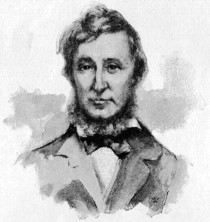Thoreau's Pencils
Today, we meet another side of Henry David Thoreau. The University of Houston's College of Engineering presents this series about the machines that make our civilization run, and the people whose ingenuity created them.
In 1821, Charles Dunbar discovered graphite in New Hampshire. In those days they called graphite "plumbago." Dunbar set up a pencil factory with his brother-in-law, John Thoreau. When that plumbago ran out, they went to Massachusetts and then Canada. They made a good start, considering the poverty of American graphite. Most of it had a greasy, smeary, quality. English graphite was the best available, but it cost an arm and a leg.
John Thoreau's son, Henry David, was raised in the business. He studied at Harvard through the mid-1830's, but he also kept a hand in the business. Pencil leads were made by filling a groove in a piece of wood with a mixture of ground graphite and some kind of binder. Henry David Thoreau worked on the problem of making a better pencil out of inferior graphite.
He solved the problem by using clay as the binder. With clay he created a superior, smear-free pencil whose hardness was controllable. He made the Thoreau company into America's leading pencil maker.
That catches us off guard. Was the great transcendentalist, who rose above himself on the shores of Walden Pond, a successful inventor? Was this the same man who formulated the idea of civil disobedience? Was this the person who so effectively armed Gandhi and Martin Luther King?
Thoreau's clay-mixed graphite wasn't entirely original. The Germans had used something like it a few years earlier. It's not clear whether Thoreau had any inkling of the German process. But what is clear is that he transcended it. He developed a new grinding mill. He developed all sorts of process details. Historian Henry Petroski adds to the list of Thoreau's inventions -- a pipe forming machine, water wheel designs. They probably never told you in your English class that Thoreau often signed the words "Civil Engineer" after his name.
Yet Thoreau was content to walk away from an invention without making personal profit of it. He was, after all, the same man who wrote
... the seventh day should be man's day of toil ... and the other six his Sabbath of the affections and the soul -- in which to range this widespread garden, and drink in the soft influences and sublime revelations of Nature ...
Henry David Thoreau is sometimes painted as ineffective in the real world. He certainly did separate himself from the mad ambitions of mid-nineteenth century America.
But his legacy to us was shaped by an engineer's intimacy with firm-rooted reality. He knew the shores of Walden Pond were solid earth, as much as they were a flight of the mind.
I'm John Lienhard, at the University of Houston, where we're interested in the way inventive minds work.
(Theme music)
Petroski, H., H.D. Thoreau, Engineer. American Heritage of Invention and Technology, Vol. 5, No. 2, pp. 8-16.
For more on Thoreau, see: http://www.library.ucsb.edu/thoreau


19th century American pencils from A. W. Faber's Price-list of Ö, 1897
(Images courtesy of the Art and Architecture Library, University of Houston)

(From the August, 1895, Century Magazine)
Henry David Thoreau